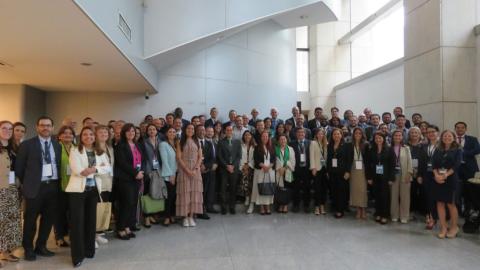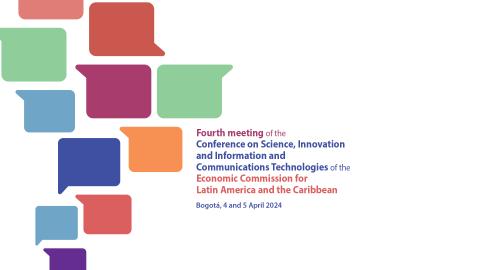Press Release
Compliance with the 2030 Agenda for Sustainable Development requires multilateral cooperation and commitments on fiscal, technological and financial matters, Alicia Bárcena, Executive Secretary of the Economic Commission for Latin America and the Caribbean (ECLAC), affirmed today during a high-level dialogue organized by the United Nations Economic and Social Council (ECOSOC) in New York.
ECLAC’s most senior representative and coordinator of the United Nations Regional Commissions participated in the event “Where are we heading? Visions and projections for the future of the SDGs,” where she underscored that, for the implementation of the Sustainable Development Goals (SDGs) in a context of escalating risk of a global trade war, countries must keep the mobilization of the means to implement the 2030 Agenda as a top priority, with particular emphasis on financing and technology.
This includes channeling investment toward sectors that have a low carbon path and are environmentally sustainable, as well as fighting tax evasion and avoidance, she added.
Along with Alicia Bárcena, others participating in the first panel of the event on “Trends in the global economy and international trade and finances” included Lui Zhenmin, UN Under-Secretary-General for Economic and Social Affairs (DESA); Mukhisa Kituyi, Secretary-General of the United Nations Conference on Trade and Development (UNCTAD); and Masamichi Kono, Deputy Secretary-General of the Organization for Economic Cooperation and Development (OECD).
Other participants included Bjorn Gillsater, Special Representative to the United Nations for the World Bank Group; David Robinson, Assistant Director of the African Department, International Monetary Fund (IMF); and Robert Teh, Chief of Economic Research and Statistics, World Trade Organization.
During her remarks, ECLAC’s Executive Secretary underlined the need to create new compacts between the public and private sectors to advance toward compliance with the 2030 Agenda and the SDGs.
She specified that the voluntary national reviews and the efforts being made by countries are very important; however, there are many relevant issues at the regional and global levels that require the attention of all, particularly the design and implementation of measures, policies and strategies for the implementation of the 2030 Agenda.
One of these is tax evasion and avoidance in Latin America and the Caribbean, which has reached $340 billion dollars, or 6.7% of regional GDP.
“This is not a national problem. Tax evasion is a very serious problem in many of our countries. It is urgent that we put an end to the culture of privilege. We need for big transnationals to pay, because public services are not provided by private companies, but rather by the States that finance them,” she affirmed.
She also stipulated that governance of the natural resources of Latin America and the Caribbean is needed, which involves, among other things, transnational companies paying taxes in the places where they make their earnings.
The senior United Nations official also raised the alarm on the situation of middle-income countries that cannot obtain concessional financing. “We do not want official development assistance, but we need a transition before graduating,” she pointed out. She said that, of the 33 countries that make up the region, 32 are considered middle-income countries, i.e. on the path to development.
Finally, she called for measuring what the impact of the globalization of technology will be on Latin America and the Caribbean and indicated as priority issues the investment in infrastructure 4.0 and gaining clarity on the blurry lines between trade and services.
Later in the day, at the seat of Trinidad and Tobago’s Mission to the UN in New York, ECLAC’s Executive Secretary met with the ambassadors and permanent representatives of various countries of the Caribbean Community (CARICOM) to the United Nations, where she reaffirmed the strategy known as “The Caribbean first,” which ECLAC has been promoting in recent months.
On this occasion, Bárcena renewed her commitment to the Caribbean and vowed to continue making strong calls for supporting the countries of the subregion in all international forums, so that they can overcome the vulnerabilities that afflict them, and advance in a determined fashion toward the achievement of the 2030 Agenda’s Sustainable Development Goals (SDGs).
Among those present at the gathering were Pennelope Beckles, the Ambassador of Trinidad and Tobago to the global organization, and diplomatic representatives from Antigua and Barbuda, the Bahamas, Barbados, Belize, CARICOM, Grenada, Guyana, Jamaica, Saint Kitts and Nevis, Saint Lucia, Saint Vincent and the Grenadines and Suriname, in addition to Diane Quarless, Director of ECLAC’s Subregional Headquarters for the Caribbean (located in Port of Spain, the capital of Trinidad and Tobago).
“‘The Caribbean first’ strategy arose from the enthusiasm and expressions of solidarity toward the subregion during the second meeting of the Forum of the Countries of Latin America and the Caribbean on Sustainable Development, held in Santiago, Chile last April and where Caribbean participation was very powerful. On that occasion it became clear that the unique combination of circumstances that these countries face can weaken their valiant efforts to achieve sustainable development,” Bárcena told the authorities gathered.
She added that this strategy seeks to put the focus on the persistent challenges to development in the Caribbean, raising the levels of national and regional support in the quest for solutions, giving primacy to the issues that critically affect the subregion in all of ECLAC’s forums, galvanizing financial help and technical assistance to address its priorities, and promoting greater participation of the entire Caribbean in the Commission’s meetings and initiatives.
In her remarks, Alicia Bárcena also presented the main conclusions of ECLAC’s report The Caribbean Outlook, which provides data showing the Caribbean’s current vulnerability in economic, financial, social and environmental terms.
She also referred to the initiative of swapping debt for climate change adaptation – a proposal made by ECLAC in late 2015 – as an innovative strategy that implies taking advantage of concessional flows to transform the subregion’s debt into a source of investment in resilience, while at the same time reinvigorating growth and promoting the transformation of its economies through investment in projects for adaptation and green industries.
“At ECLAC we have committed ourselves to supporting the Caribbean in the implementation of the 2030 Agenda and the SDGs, ensuring financing through cooperation agencies, providing technical assistance to governments so that follow-up of these goals be included in national development plans, strengthening local statistics offices, and organizing gatherings to facilitate peer review with a subregional approach,” Bárcena stated.
With these activities today, ECLAC’s Executive Secretary concluded an extensive and fruitful tour of New York, where she participated in diverse sessions and side events to the High-level Political Forum on Sustainable Development (HLPF), held at UN headquarters, where several countries – including eight from Latin America and the Caribbean – presented their voluntary national reviews regarding progress on the 2030 Agenda. Bárcena also held important bilateral meetings with ministers and other authorities from several countries, the chiefs and directors of United Nations agencies and programs, and other high-ranking international officials.



